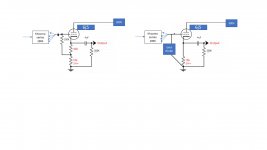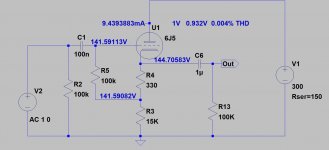jev,
I agree with TG.
1. Disconnect the bottom of the 100k resistor from the junction of the 300 Ohm resistor and 15k resistor.
2. Connect the bottom of the 100k grid resistor to ground (the bottom of the 15k resistor).
The clicking should be much quieter.
Right?
I agree with TG.
1. Disconnect the bottom of the 100k resistor from the junction of the 300 Ohm resistor and 15k resistor.
2. Connect the bottom of the 100k grid resistor to ground (the bottom of the 15k resistor).
The clicking should be much quieter.
Right?
The stage pictured will have 50-100V DC (depends on the B+) at the input, and you're basically short-circuiting those volts to the ground with the TVC secondary.Not sure what you mean?
The resistor values I still have to determine further but the schema is as I build
You either need to add DC blocking capacitor to the input of this stage, or leave out the 15k resistor and connect cathode and grid resistors directly to the ground.
If the transformer can not drive a 100k grid leak resistor, then it probably can not drive the capacitance of the 6SN7 grid either.
The coupling cap to the grid needs to be picked according to the grid leak resistance.
And, yes, the effective grid leak resistance is multiplied by the bootstrapping effect.
The coupling cap to the grid needs to be picked according to the grid leak resistance.
And, yes, the effective grid leak resistance is multiplied by the bootstrapping effect.
The slightly different voltage across R5 is due to either one of 2 things:
A. The grid of the 6SN7 is leaky / or has contact potential.
Or
B. The non-repeatable variance of the measurement (too many places is like too many cooks spoiling the broth).
Some averaging may be in order.
A. The grid of the 6SN7 is leaky / or has contact potential.
Or
B. The non-repeatable variance of the measurement (too many places is like too many cooks spoiling the broth).
Some averaging may be in order.
Last edited:
I have just changed the setup the 100K is now 1 meg and the C1 is indeed 0.1 uF
Plays just fine very transparent best I ever had. The power supply is 100% MKP with Russian Teflon by-pass
Input capacitor are also Russian Teflon. Output capacitor is combination of very old UK paper in oil 4uF and by-pass Teflon
Only no remote and have to wait for the Khozmo (100K series with remote)
Wiring is 100% silver with Teflon for signal and silver-copper with Teflon for most of the rest
Also I have paid attention to vibration control. Most of the parts are on modules which are decoupled with rubber grommets from the main chassis. Below chassis are SSC feet that I buy second hand in Germany
Plays just fine very transparent best I ever had. The power supply is 100% MKP with Russian Teflon by-pass
Input capacitor are also Russian Teflon. Output capacitor is combination of very old UK paper in oil 4uF and by-pass Teflon
Only no remote and have to wait for the Khozmo (100K series with remote)
Wiring is 100% silver with Teflon for signal and silver-copper with Teflon for most of the rest
Also I have paid attention to vibration control. Most of the parts are on modules which are decoupled with rubber grommets from the main chassis. Below chassis are SSC feet that I buy second hand in Germany
Last edited:
Teflon and silver produces noise, "triboelectric efect" not recomendated for sensitive small signal circuits, please use cheap plain copper cable for all and your circuit and wallet will be thankfull.
Is any literature?Teflon and silver produces noise
IMHO it's misconception, the practice contradicts this.
"triboelectric efect" not recomendated for sensitive small signal circuits.
"The triboelectric effect is related to friction only because they both involve adhesion. However, the effect is greatly enhanced by rubbing the materials together, as they touch and separate many times."
Is any literature?
IMHO it's misconception, the practice contradicts this.
"The triboelectric effect is related to friction only because they both involve adhesion. However, the effect is greatly enhanced by rubbing the materials together, as they touch and separate many times."
Do you know you can use a piezoeoectric buzzer as a low value capacitor?
Also they commonly have a silver deposition electrode what a better material for a capacitor electrode, 😀
Yeah no body in its craziest dreams would use those things, as capacitors in small signal circuits, in fact, do you know what's the surface contact area of those things?. And also whats the surface contact área per cm long of a simple 20 AWG solid wire?
Hint: they almost the same ballpark 😱
Because you can doesnt mean you should, please dont twist or heat or stress the cable in every possible way then you will have a neglible detrimental effect 😉
"random triboelectric noise is generated when the various conductors, insulation, and fillers rub against each other as the cable is flexed during movement."
Where is such movement during listening music?
The only moving part is loudspeaker's coil (CD practically dead)...
How triboelectric voltage in audio device proportionate to signal?
Are you know Mil-w-22759 standard?
Each aircraft full of silver/silver coated PTFE wire.
The disadvantage of PTFE is tendency to flow ... if a constant force acts on it.
Where is such movement during listening music?
The only moving part is loudspeaker's coil (CD practically dead)...
How triboelectric voltage in audio device proportionate to signal?
Are you know Mil-w-22759 standard?
Each aircraft full of silver/silver coated PTFE wire.
The disadvantage of PTFE is tendency to flow ... if a constant force acts on it.
- Home
- Amplifiers
- Tubes / Valves
- Sowter 9335 as input - hard noise when switching

